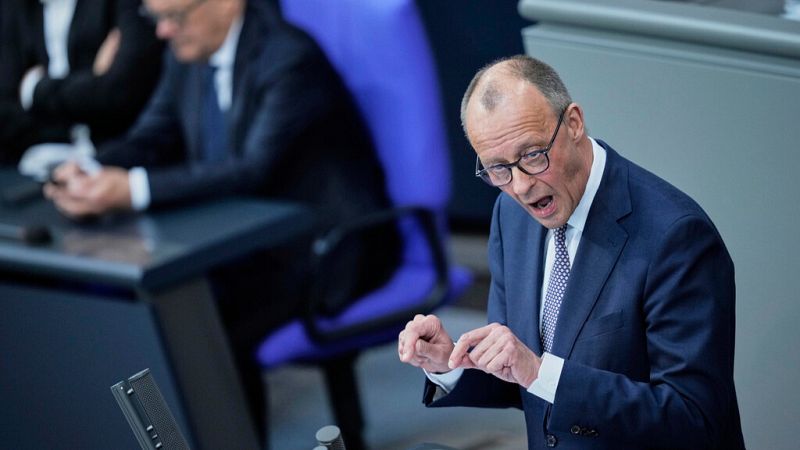

Germany's parliament on Tuesday passed a historic bill unlocking a record level of state borrowing for defence and infrastructure through amending the country's constitutionally enshrined fiscal rules.
The motion passed in the parliament with 513 votes in support, exceeding the necessary threshold of 489 votes.
The legislation still requires approval from two-thirds of the members in the Bundesrat, which is Germany’s upper chamber representing the nation's federal states, to be enacted into law.
The key vote in the Bundestag came after weeks of discussion began when Merz’s Christian Democratic Union (CDU), along with potential coalition allies the Social Democrats (SPD), proposed measures to relax Germany's debt brake—a constitutional rule limiting borrowing—thus enabling trillions of euros in additional expenditures.
Merz was engaged in a high-stakes competition to get the proposal approved before the new parliament convened on March 25th. At that time, the far-left party Die Linke and the far-right AfD could potentially obstruct the entire package.
Initially hesitant about endorsing the bill, the Greens decided to back it after Merz assured them last week that €100 billion from the dedicated fund would go toward fostering climate-related economic changes.
This landmark agreement signifies a move away from years of cautious financial policies. Among the plans, defense expenditures exceeding 1% of Germany’s GDP are essentially excluded from the nation's "debt brake," a rule incorporated into the constitution back in 2009.
A special fund worth €500 billion will be established to finance infrastructure projects beyond the regular budget for the coming ten years, allowing Germany’s 16 federal states to borrow an amount roughly equaling €15 billion.
Merz — who opposed reforms of the debt brake throughout his career — now argues that his change in stance is essential due to shifts in the security environment.
"Both our opponents and those who oppose our democratic and rule-based system are watching us closely, just like our allies within the EU," Merz stated on Tuesday before the vote.
Germany's Defence Minister Boris Pistorius supported the move to suspend budgetary constraints in order to allocate funds towards strengthening the country’s military, particularly addressing the severe shortage of resources within its armed forces.
Pistorius stated that our security should not be compromised due to financial limitations," and he further emphasized that "those who waver today are refusing to acknowledge the truth.
On Tuesday, some of the harshest critiques within Parliament emerged from the AfD and the libertarian Free Democratic Party (FDP). The FDP attempted to obstruct the proposal by proposing an eleventh-hour amendment.
The reactions of the German stock market and the euro were notable positively Prior to the vote, which specialists indicate could propel Germany out of its two-year period of sluggish economic performance.
Many economists support taking on debt to fund extra security and defense requirements, yet they've consistently emphasized that the infrastructure plan ought to be paired with, or substituted by, robust reforms in various sectors, as stated by the economic research institute Ifo.
Experts argue that reforms in public administration, pensions, energy, along with tackling the nation's severe labor shortage, are urgently required.
Marcel Fratzscher, who leads the Berlin-based economic research institute DIW Berlin, reaffirmed to Euronews that "reforms in administrative processes and labor laws are necessary in various sectors to enable such investments to take place."
This package represents a significant move in the correct direction, yet it is insufficient on its own. We require reforms to the debt brake so that we can consistently incorporate expenditures for infrastructure, education, and defense into the federal budget.
The legislation still requires a supermajority in the Bundestag, which is Germany's lower house.
In this scenario, the CDU, SPD, and the Greens require support from an additional political party to approve the legislation.

Our website uses cookies to improve your experience. Learn more